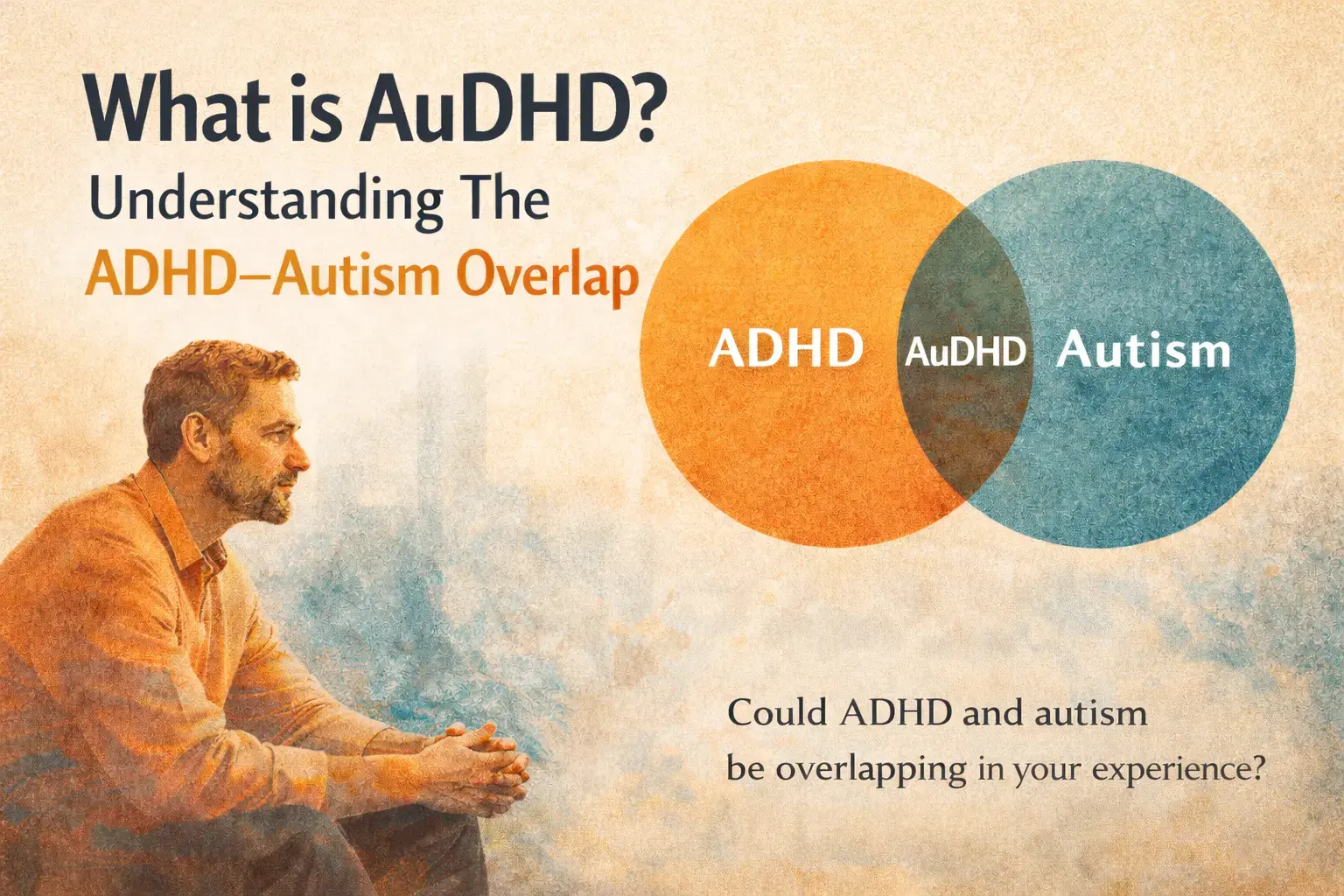Why Neurodivergent Men Struggle to Recognize Their Own Needs
.jpg?width=400&height=269&name=Neurodivergent%20men%20struggle%20to%20recognized%20%20(1).jpg)
Adapted from bell hooks
You make it through another day on autopilot. The emails, meetings, and decisions are behind you. Still, there’s a tension inside that’s hard to describe. You find yourself sitting in your car before heading home, staring at the dashboard longer than you meant to. Earlier, when someone asked how you were, you just said “Good” because it was simpler. If you tried to answer honestly, you might not even know what’s happening inside your body or mind.
For many neurodivergent men, this is not a crisis moment. It’s Tuesday.
The issue usually isn’t that you don’t have feelings. More often, it’s the idea that you shouldn’t notice or talk about them. Traditional masculinity teaches men that needing support is a weakness. For neurodivergent men, there’s often a stronger sense of not fitting in or being out of sync with expectations traditional masculinity reinforces, and that never matched how you really feel. Neurodivergence can make it even harder to recognize emotions, especially when the words others use don’t match your own experience. This creates a gap between what you feel and what you can name. That space can feel lonely and familiar at the same time, and it can last for years.
You may appreciate how these themes connect to relational patterns explored in neurodivergent men & relationship challenges.
How Masculinity and Neurodivergence Collide
Boys who cry are told to toughen up. Boys who show fear are told to be brave. Boys who struggle quietly are praised for “handling it like a man.” The pathway into adulthood is paved with messages to suppress vulnerability. Strength becomes defined by silence.
Neurodivergence brings extra challenges, like intense sensory experiences, social exhaustion, pressure to hide your real self, burnout, and feeling overwhelmed. For many, this means moving through the world with tools that never quite fit the circumstances, like trying to read social cues or manage your energy in places that you feel overstimulated. With so much going on inside, it can be hard to figure out what each feeling or sensation means, especially when the world’s feedback to you rarely matches your own reality. Many men end up believing things like:
Do you recognize any of these?
“I should be able to handle everything on my own.” (Self-reliance becomes proof of worth and safety.)
“If I can’t describe what I’m feeling, it must not matter.” (Alexithymia gets misinterpreted as a lack of valid inner experience.)
“My needs are an inconvenience to others.” (Support becomes something earned through masking and performance.)
“Struggling means something is wrong with me.” (Differences are seen as deficits instead of very human realities.)
“Showing emotions will make people see me as weak or incapable.” (Vulnerability is equated with failure rather than connection.)
But your body still reacts, showing tension, headaches, shutdown, withdrawal, or sudden outbursts.
When did you learn that showing your needs could cost you acceptance or respect?
When Emotions Go Unnamed
A significant number of autistic and ADHD men experience alexithymia, which is a difficulty in interpreting emotional cues within the body. This does not mean emotions are missing. It just means the way emotions are understood develops differently.
Someone might feel:
- A stone in the stomach
- Pressure behind the eyes
- Tight shoulders
- Irritability
- Brain fog
Yet, they still do not know whether they are stressed, sad, afraid, or overstimulated.
I once described it as:
“My emotions are behind a locked door, and I wasn’t given the key.”
Could the tightness in your chest today be anger? Could the heaviness be exhaustion? What might your body be trying to communicate long before your mind has the words?
The Cost of Masking Capability
Being told you’re good at handling things isn’t always a compliment. Sometimes, it can feel like you’re stuck. Neurodivergent men who get used to hiding their struggles often become the ones others rely on. They seem strong, independent, calm, or unaffected. But underneath, there may be a quiet wish to be seen for more than just resilience, to have softness, uncertainty, or tiredness noticed without fear of judgment. Pretending takes a lot of energy and can make you lose touch with who you really are, sometimes leaving you wondering if anyone actually knows the real you. When needs are pushed aside for too long, your body eventually demands attention:
Irritability replaces patience.
Shutdown replaces the connection.
Numbness replaces curiosity.
It’s not a lack of resilience; it’s a history of survival.
What happens inside you when you force yourself to handle everything alone?
This is at the core of the neurodivergent high-achieving trap.
Sensory Overload Misunderstood
Most people cannot see sensory input. They only notice the reaction if it becomes too much to hide. A brightly lit office, a buzzing HVAC fan, a chaotic classroom, or a crowded grocery store can quickly drain a neurodivergent nervous system. Because this exhaustion isn’t visible, men are often told they’re overreacting or too sensitive.
When others dismiss your discomfort, it can become harder to trust your own experience. Sensory signals get ignored, minimized, or overridden.
You might not realize how overwhelmed you are until your patience vanishes or you shut down without warning.
How does your body let you know that the environment has become too much?
Shame’s Hidden Curriculum
There is often a hidden belief beneath the silence:
“My needs make me a burden.”
This belief rarely begins inside us. It is taught through subtle nudges and outright criticism:
- “Don’t make a scene.”
- “You’re being dramatic.”
- “Just deal with it.”
Over time, support becomes something earned through performance, not something deserved by existing.
Men learn to disappear behind usefulness.
But needs do not disappear just because they are ignored. Over time, they build up in the background until they finally come out.
Rebuilding Self-Awareness with Self-Compassion
The goal isn’t to become someone else. It’s about remembering who you are beneath all the expectations and habits you’ve built to protect yourself. This process can be gentle and ongoing, honouring the ways you’ve adapted to survive while making space to be curious about parts of yourself that have waited quietly for years. There’s no need to hurry. Every step toward understanding yourself is an act of care.
Instead of asking, “How do I feel?” try:
“What is happening physically right now?”
Sensations are often the first signal neurodivergent bodies send.
If that sensation could speak, what might it say?
Often, we work to build acceptance, self-compassion and resilience.
Understanding Needs as Valid
Neurodivergent needs are human needs made stronger by circumstance. There is nothing shameful or excessive about needing rest, quiet, clarity, or validation. These needs do not take away from your capability or worth. They are signs pointing toward deeper self-knowledge and a life that feels more sustainable. Meeting these needs does not mean you are failing; it means you are listening to your own truth. Rest is not avoidance.
Space is not rejection.
Support is not a dependency.
If you permitted yourself to need something today, what would you allow?
Redefining Strength
Care is not weakness. It is a responsibility to the self.
Allowing others to witness your truth is an act of courage.
Independence might feel safe, but connection is what allows nervous systems to settle.
What belief about masculinity keeps you further from the support you deserve?
Listening to Anger Differently
Anger often appears when earlier, quieter signals were missed.
It can act as a protector, like a flare in the sky that signals unmet needs.
The next time anger shows up, what might it be trying to guard?
Related reflections include Boundaries for Neurodivergent Self-Care.
A New Story for Neurodivergent Men
Many neurodivergent men are thoughtful, principled, deeply loyal, and intuitive in their own ways. There’s often a quiet skill in how you move through the world, whether it’s noticing patterns others miss, caring about small details, or making space for complexity when it matters. The world may not always notice this depth, especially when it values sameness, speed, and holding back emotions. But there is strength in being sensitive and open, not shame.
There is depth in internal experience, even when language comes slowly.
There is profound wisdom in meeting the world differently.
Your needs do not diminish your masculinity.
Your self-awareness deepens it.
If identity plays a role in what you’re navigating, my piece on the role of identity in neurodivergent healing expands on these experiences.
Some Questions to Guide Personal Reflection
When you notice frustration or shutdown, what emotion might have come first?
What would it feel like to let someone see what you’re carrying?
Where in your life do you need more support than you have allowed yourself to acknowledge?
There is no urgency to answer. Awareness unfolds at its own pace.
If what you’ve read here resonates, therapy can offer a place to explore these experiences with curiosity and care. There is no pressure to be ready, to share everything at once, or to have perfectly formed words.
You are allowed to know yourself.
You are allowed to need.
And you are allowed to be supported.
To learn more about my therapeutic lens with neurodivergent men, you’re welcome to visit my About Michael page, where I share how I help men reconnect with their emotional and relational needs.
If you’d like to explore these themes in your own life, you can reach out through my contact page to begin that conversation.
Or stay on the blog and learn more about ADHD, Autism, and Giftedness.
Blog Disclaimer
This blog includes occasional personal anecdotes used to illustrate therapeutic ideas and foster connection. All identifying details have been altered or omitted to protect confidentiality. These reflections are intended as examples only; every individual’s experience is unique, and what resonates for one person may not apply to another.
The information provided here is for educational and informational purposes and should not be considered a substitute for professional medical or mental health advice, diagnosis, or treatment. If you have concerns about your health or well-being, please consult a qualified healthcare provider or licensed mental health professional.
Psychotherapy services described on this site are available to residents of Ontario. If you are interested in support or would like to schedule a complimentary 20-minute consultation, you are welcome to contact me through my practice.
These resources are offered to support your learning and self-understanding as you move toward a more grounded, authentic, and meaningful life.

Michael Holker HBA, BSW, MSW
Michael Holker, MSW, RSW, is the compassionate heart behind Becoming Yourself Counselling. Discovering his own neurodivergence later in life shaped his existential, humanistic, and strengths-based approach to therapy. Guided by his lived experience, Michael helps neurodivergent individuals move beyond self-criticism toward self-understanding, self-compassion, and self-acceptance. His work invites clients to honour their journeys, embrace their resilience, and reconnect with their authentic selves, cultivating a life of greater alignment and meaning.


